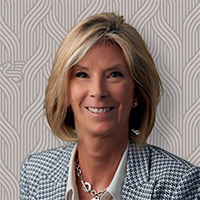 Lindsay Ozanne, Managing Director at Butterfield Trust (Guernsey) Limited, explains how the shift to remote working during the Covid-19 pandemic has changed the way colleagues communicate and reshaped the relationship between businesses and clients
Lindsay Ozanne, Managing Director at Butterfield Trust (Guernsey) Limited, explains how the shift to remote working during the Covid-19 pandemic has changed the way colleagues communicate and reshaped the relationship between businesses and clients
It’s hard to believe that we’ve been dealing with the Covid-19 pandemic for nine months now. As businesses across all sectors locked down in March, the way people worked changed dramatically, with many being forced to do so remotely.
Lockdown and restrictions on travel also meant that financial services clients were unable to meet with their banks, trustees and advisers on a face-to-face basis.
Along with this came the seismic shift to video calling through now-familiar platforms such as Zoom and Microsoft Teams. While these technologies gave us the practical tools, the way we actually communicated with each other at the start of the pandemic provided particular challenges.
For a start, it was hard to interpret body language (that is if people bothered to turn on their camera), which plays a big part in how we perceive what people are telling us.
From a workplace perspective, video calls also made it difficult for managers to pick up on how people were feeling. All of a sudden, we had to listen more closely to what was being said.
Butterfield wasn’t alone in placing a lot of emphasis on the wellbeing of individuals in the early days of the pandemic – something we still do to this day. We were very mindful of those who were isolated living in a one-bedroom flat and those who were struggling with the practicalities of juggling family life with work.
From a communication perspective, this meant being more empathetic, asking the right questions about how people were coping, and making it clear that help was available if they needed it.
It soon became clear how much we take for granted those daily, seemingly trivial, workplace conversations. In reality, they’re important because they help create a sense of belonging. Working remotely doesn’t give you that opportunity.
So, like many businesses, we tried to replicate the work experience as much as possible within the remote world. This meant that alongside regular business meetings and addressing work-related matters, we also had coffee calls with team members, where we just chatted and checked in on how everyone was doing.
What really helped was seeing everyone in their home environment, as it made all of us, especially managers, seem more human, with everyone realising we were all in this together.
The pandemic also made us think about communication in a much more structured way. The management team spoke every day so we could find out what was working well and what wasn’t, and learn from each other’s experiences.
We also made sure that everyone knew about any changes that were happening to the business and our operations, such as returning to the office, so that no one was left in the dark.
Meeting clients’ needs
As much as the pandemic was a challenge for those working at Butterfield, there were difficulties from a client perspective as well – especially in the trust business, where it is very typical to meet face-to-face.
Naturally, our clients weren’t only worried about health issues, they were also concerned about their financial wellbeing. As a result, we went out of our way to contact each client right at the outset, to find out what they were thinking and what was worrying them.
 In many cases, they initially just needed reassurance that we were still there.
In many cases, they initially just needed reassurance that we were still there.
Critically, we wanted to communicate with them in the way they felt most comfortable. For second- and third-generation clients, video technology is the norm, it’s the way they communicate, whereas some older clients preferred a phone call.
That said, some of the older generations happily embraced video calling.
It’s fair to say that existing clients settled into this new way of communicating pretty quickly and video calling has now become standard practice. For new clients, it was slightly more challenging – in the trust world, it’s unnatural to give assets to people you don’t know or haven’t met.
Although video conferencing can’t beat meeting people in the flesh, one positive point was that we could put the whole team in front of a client at the same time, which helped create a necessary sense of reassurance and confidence.
Beyond Covid
As we move into 2021, we have implemented a lot of changes in the way we communicate internally, and that genie can’t be put back in the bottle.
We’re well aware that, in Guernsey, we’re lucky in that we’ve been back in the office since June, while in other jurisdictions that isn’t yet the case. We have to be sensitive to that.
But we are fortunate in how video calls have become normal because they’ve allowed us to deepen relationships with colleagues in other locations.
It’s strange to think that we would have previously held meetings via conference call, which now seem impersonal by comparison. So, video calls are very much the way forward.
Even now that people are back in the office (in Guernsey at least), we need to make sure that we keep up the sense of openness that came during the pandemic – for people to be able to ask questions, raise their hand when there is an issue, and for us to check in with each other.
The reality is that people may choose to work from home for some of their time going forward, so we need to build on what we have learned and communicate in a way that is best, both in-person and remotely.
As such, communication needs careful nurturing to make sure it’s pitched at the right level; to make sure we don’t go back to old habits, but not to be intrusive or make assumptions that people are fine.
When you see people in the office every day, you can pass by and see that they’re okay. There are a lot of skills we still have to learn with virtual management.
From a client perspective, it’s also a case of making sure we have the balance right. Whereas we might have only seen a client once a year or less, for example, we don’t want to overwhelm them with video calls now. So, we continue to be led by what clients prefer.
Interestingly, this new way of doing business has actually opened doors for the Channel Islands. There is now an opportunity to reach clients who perhaps wouldn’t have considered the islands before because of distance.
While business trips always limited the number of people who could go and meet a client, now we can showcase a wider team in front of them.
What’s more, video conferencing also makes it easier to get people such as lawyers and intermediaries in the room all at the same time.
And considering we don’t know when we will be able to get on a plane again – or indeed feel comfortable with doing so – this is a significant benefit.
There’s no doubt Covid-19 has provided a range of communication challenges that we’re still navigating to this day, and we are continuing to learn what works and what doesn’t.
However, I’m optimistic that, going forward, the positives will help businesses, employees and clients communicate in a way that benefits everyone.
Find out more
For more information please contact:
Lindsay Ozanne, Managing Director, Butterfield Trust (Guernsey) Limited
Tel: + (44) 1481 733213
Email: Lindsay.Ozanne@butterfieldgroup.com
• This advertising feature was first published in the Digital Edition of Businesslife in December 2020
Four tips for better remote communication
• Listen to people Find out how they want to communicate and how often. What are they struggling with and how can you work around it? Be patient.
• Check in regularly Make sure that employees are coping. Probe when necessary and give people the confidence to open up.
• Use what you have learned Build on what has worked, analysing why it was successful, and work out why some things didn’t.
• Don’t go backwards As we emerge from the pandemic, don’t revert to old practices or slip into bad habits. Maintain the positives.